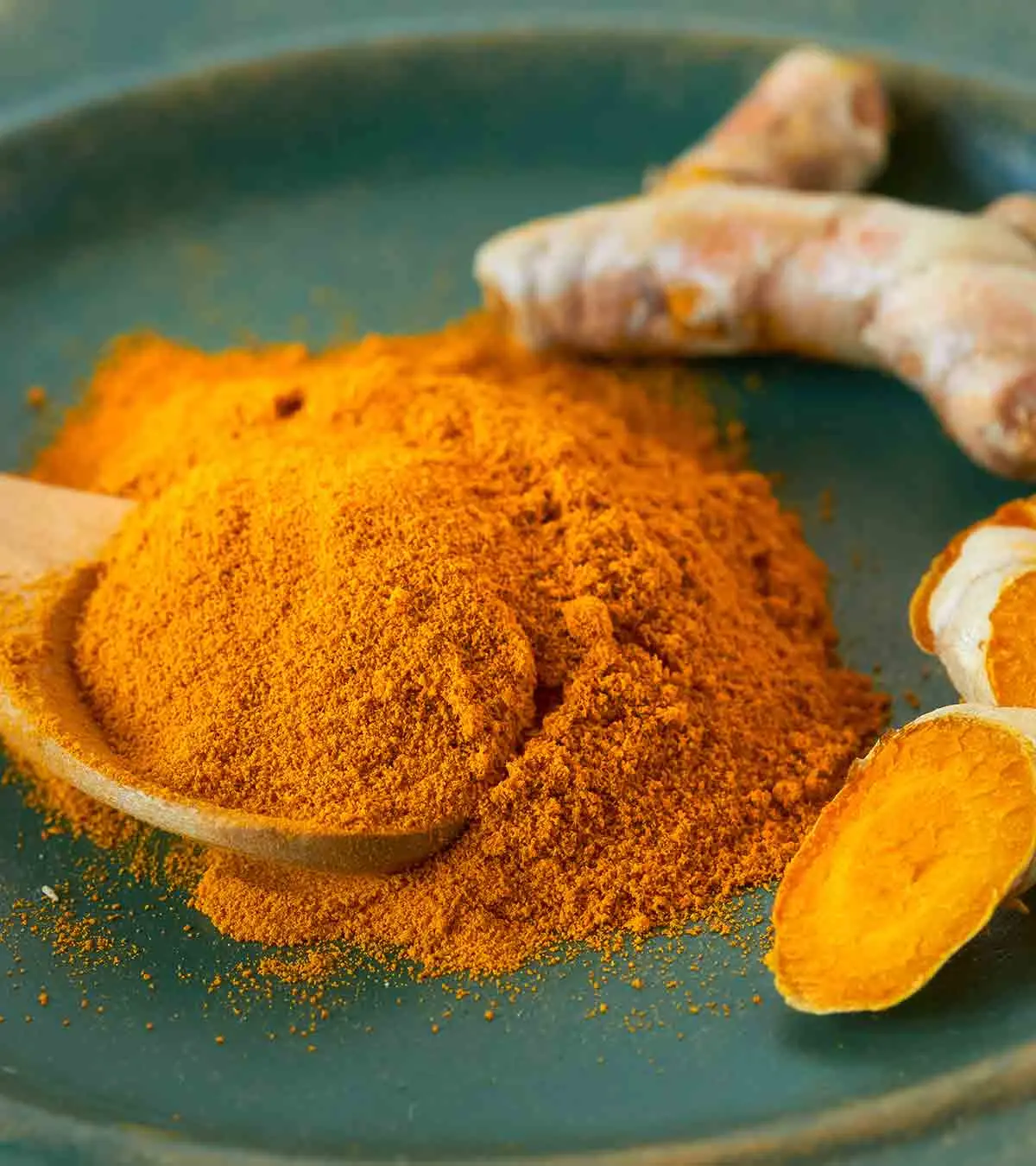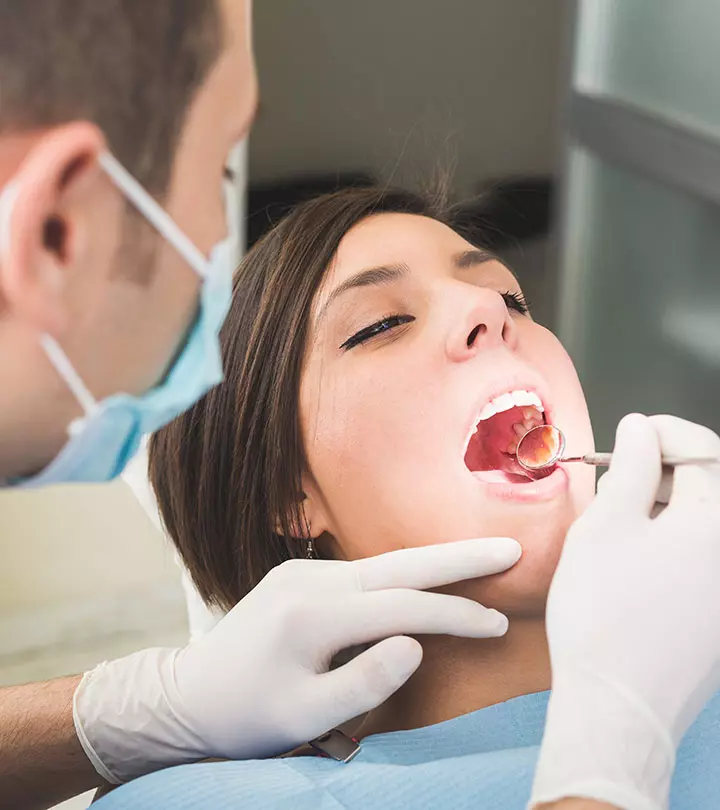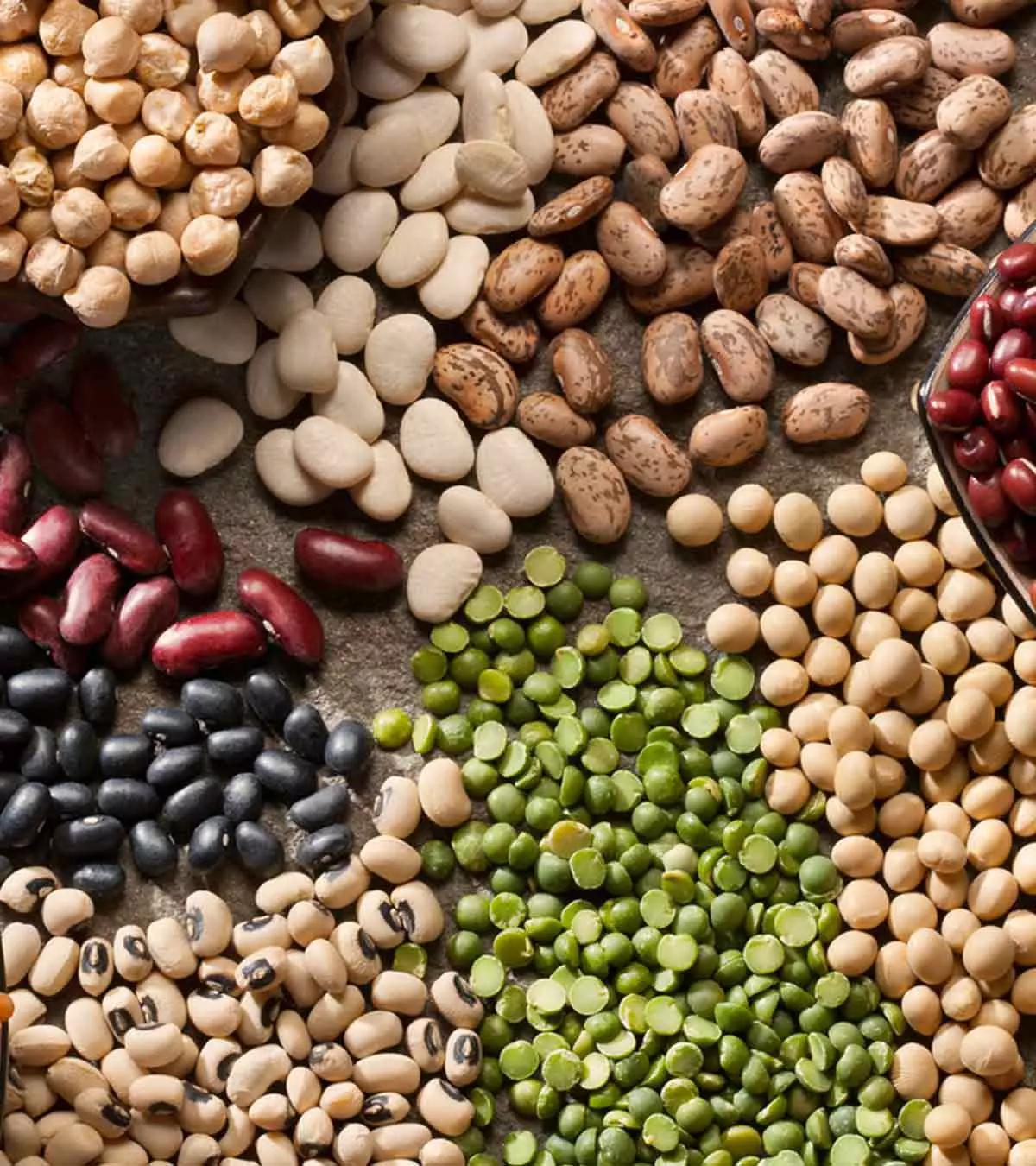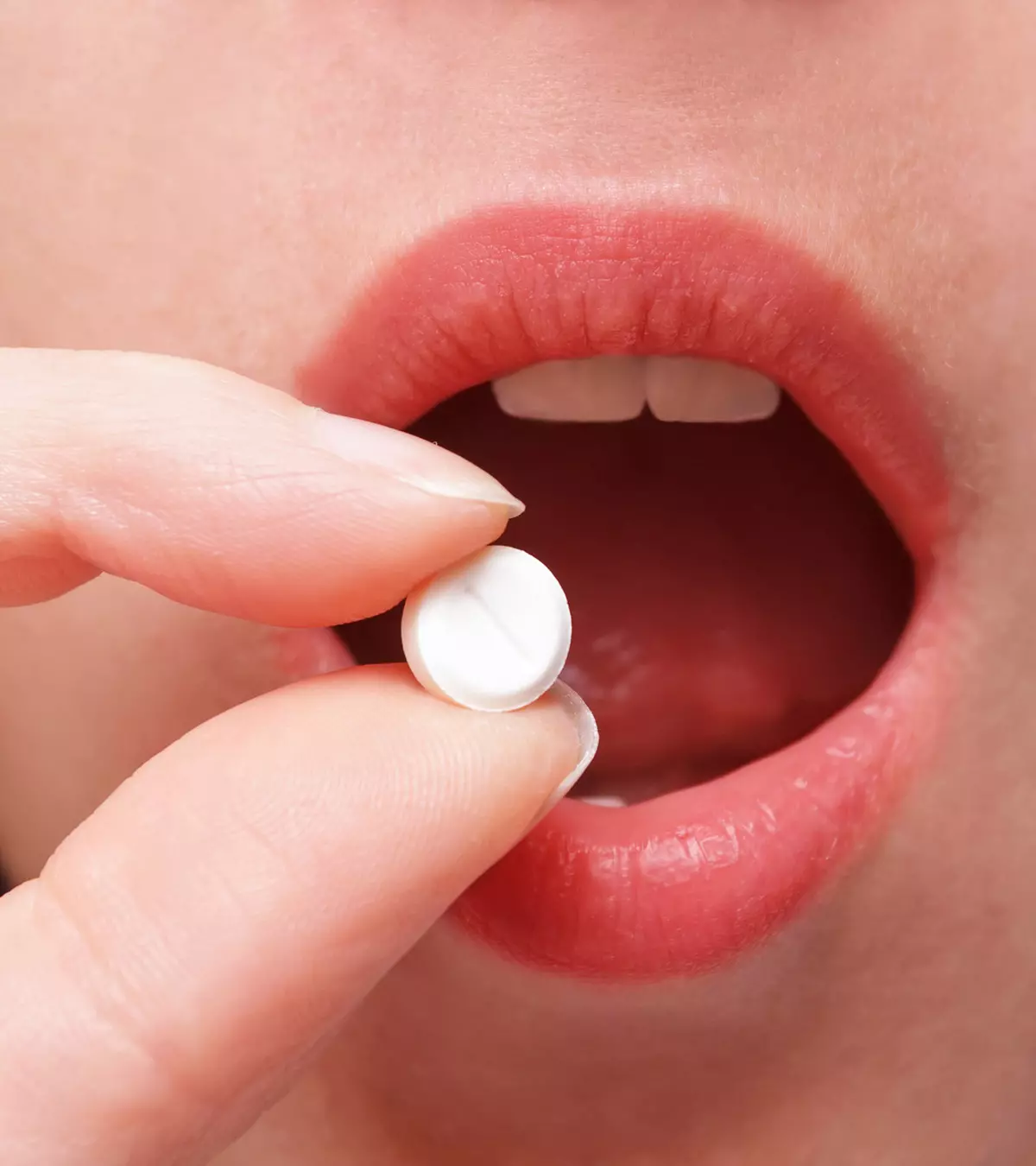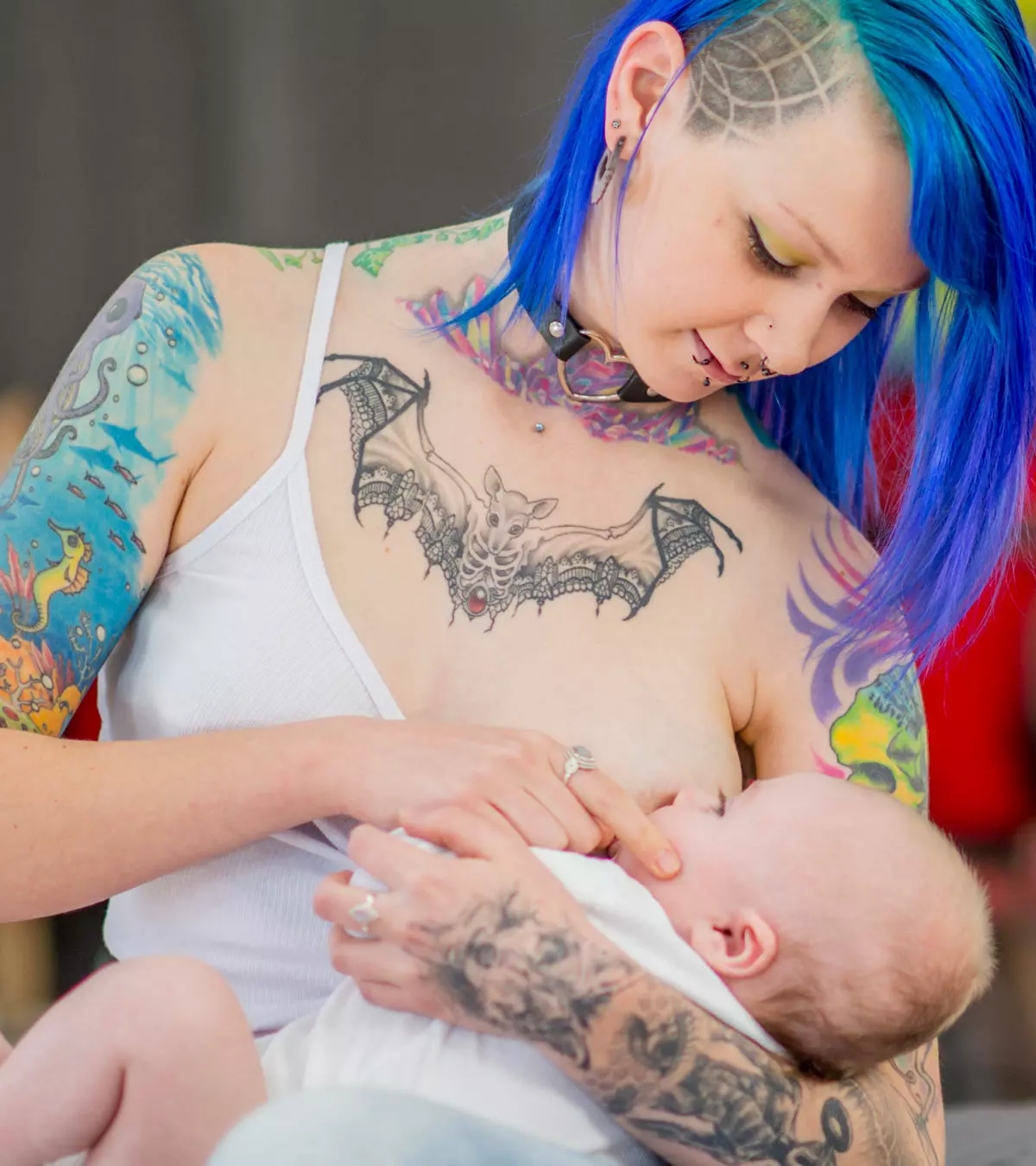
Image: ShutterStock
Breastfeeding has proven beneficial effects on both the baby and the mother. However, a headache while breastfeeding may cause discomfort. Lactating mothers may often feel a pulling sensation on their nerves during nursing, and the problem aggravates if a headache accompanies it. You may be skeptical about what is causing the headache and if it is directly related to breastfeeding. A breastfeeding headache occurs during the let-down of the milk. The headache can persist throughout the feed, although it usually improves quickly. It is thought to occur due to increased oxytocini levels in the body. If you are constantly being affected by lactation headaches, continue reading this post as we provide you with all the required information about headaches when breastfeeding and suggest ways to deal with the condition.
Key Pointers
- Headaches during breastfeeding can be caused by migraine, mastitis, or postpartum depression.
- Staying hydrated, massaging, and consuming riboflavin-rich food can alleviate headache symptoms during breastfeeding.
- Some medications can help deal with lactation headaches.
- It is important to consult a doctor before taking any medications to avoid complications.
Causes Of Headache While Nursing
Here are the probable causes of a lactation headache:
1. Migraine
If you had migraines prior to becoming a mother, then the migraines might worsen in the postpartum period. This can be due to hormonal changes or changes in medication, or simply the added stress of transitioning into your new role as a mother. A study published in the American Journal of Obstetrics and Gynecology (AJOG) found that most postpartum headaches are either tension-type or migraines, often occurring within 24 hours after delivery, especially after discharge. However, timely management with a structured, multidisciplinary approach can help prevent complications and provide relief (15).
Treatment: Consult your doctor for appropriate medications if you experience migraines during breastfeeding.
Neurologist Dr. Claire Sandoe shares her insights on migraines during breastfeeding through the American Migraine Foundation. She explains that factors like the return of your period, poor diet, lack of sleep, and stress, may trigger migraine. To manage them, she recommends planning treatment around breastfeeding and pumping after feeds to maintain supply and store extra milk for nighttime feeds (8).
 Did you know?
Did you know?2. Postpartum depression

Post-natal depression is a relatively common condition affecting 1 in 4 women in the first 12 months after giving birth. According to a study that was conducted by the Centers for Disease Control and Prevention, an estimated 13% of the women that were surveyed by health care providers in and around the United States reported depressive symptoms during the postpartum period. Feelings of hopelessness, sadness, and being overwhelmed while caring for infants can be accompanied by chronic dull headaches that refuse to go away. If you are concerned that you may be suffering with PPD, then get some familial and professional support.
Treatment: Interestingly, breastfeeding can help alleviate the intensity of a headache since it stabilizes the levels of estrogeniA sex hormone responsible for the development of female sexual characteristics in the body (1). However, it does not cure a headache, and you may need to take medication.
 Research finds
Research finds3. Mastitis
Mastitis is the clogging or blockage of milk ducts in the breast due to infection or poor release of milk. The latter case happens if the baby is not fed frequently or is having insufficient feed due to poor latching to the nipple. Milk accumulates within the breast to the point that it blocks the duct, increasing the risk of bacterial infection.
Symptoms of the condition include breast tenderness, fatigue, and headache that could be accompanied by fever (2). There is a dull to sharp breast pain every time the baby suckles or even while pumping milk. Mastitis affects nearly 20% of postpartum women and is most common in the first six weeks after childbirth (3).
Treatment: If you are concerned that you might have mastitis (red, hot, inflamed and painful breasts), particularly if you have a fever, you should consult your medical practitioner as you may need antibiotics. Remember to get plenty of rest and stay well hydrated.
4. Dehydration

Breast milk is 88% water, and the milk is all the baby needs to quench his thirst for the first six months of his life (4). Many mothers feel increasingly thirsty when they begin lactation since they need to meet the increased water requirements of their body. Not drinking enough water can lead to mild to severe dehydration, which can cause frequent headaches (5).
Treatment: Drinking sufficient water is the key to satisfying the additional fluid demand. Experts even recommend keeping a glass of water handy whenever you breastfeed your baby. It helps replenish the body with the lost fluids immediately.
5. Fatigue
Raising a baby is exhausting since you juggle with multiple tasks. You balance life’s important duties with the responsibility of having a baby, and somewhere in the process, you lose precious hours of sleep. Sleep deprivation is a genuine problem faced during the early parenting years (6).
Mothers can try different breastfeeding positions to take rest whilst feeding. The ‘laid-back nursing position’ and side-lying help the mothers relax whilst the baby is feeding.
Treatment: The best way to prevent a headache from fatigue during breastfeeding is to have ample rest. Speak to your partner about sharing responsibilities or take help from a family member so that you get sufficient sleep.
You may have treated yourself with painkillers every time you had a headache, but since you are a lactating mother, you need to avoid self-medication.
Some underlying medical conditions may also cause headaches in breastfeeding new moms.
Mirasol, a mother of three, shares how persistent headaches after a few days of giving birth to her third child, Mathia, were diagnosed as symptoms of postpartum preeclampsia. She writes, “A few days after I gave birth, I felt so dizzy and had a severe headache. There was a circle-like in my vision and so much discomfort. When my baby had her first check-up, my OB noticed that my face was swollen, the same as my legs and feet. My blood pressure was 170/110! My OB referred me to another doctor (cardio) and gave me medicine for hypertension.
“I thought after I took the medicine for hypertension, my blood pressure would be normal, but I was wrong! I monitored my blood pressure every day, and it did not change. I consulted my OB and a cardiologist; they notified me that I needed to be confined in the hospital. Initial findings of the doctor: hypertensive due to pregnancy. They called it postpartum preeclampsia (i).”
 Quick fact
Quick factWhen To Seek Medical Help
Although mild and occasional headaches are common in nursing women, it is important to recognize when to seek medical attention to prevent complications. Here are a few signs that should not be ignored pertaining to a headache while breastfeeding (16) (17):
- A sudden, severe headache lasting for several weeks
- Increasing headache intensity
- Dizziness or blurred vision
- Swelling in the face or limbs
- Fever, neck stiffness, vomiting, or nausea
- Severe pain on one side, accompanied by high blood pressure
- Breathing difficulties
- Fatigue or muscle weakness
- Neurological symptoms such as reduced concentration, altered consciousness, or seizures
If you notice any of these symptoms, consult your doctor immediately, as they may indicate a serious condition such as postpartum preeclampsia, hemorrhage, or stroke. Also, avoid self-medicating while breastfeeding and seek medical advice to ensure any treatment is safe for both you and your baby.
Treatment For Lactation Headaches

The treatment of a breastfeeding headache lies in addressing the underlying cause of the condition. Painkillers such as paracetamol can help alleviate the ache and make the mother feel better. Seek the advice of a medical practitioner if paracetamol, rest and increased intake of fluids fail to provide relief.
 Experts say
Experts saySafe Home Remedies For Lactation Headache
You can follow some home remedies to get relief from a headache during breastfeeding. These do not impact your baby anyway:
- Opt for a gentle massage: This stress-buster can help reduce the intensity of different pains, including headaches. You can hire the services of a professional masseuse or just ask your partner for a gentle head massage for pain relief. It can make you feel relaxed when feeding your baby.

- Drink plenty of water: Keeping yourself hydrated is the best way to prevent headaches caused by dehydration. Drinking sufficient water supports optimal blood flow, helping you feel refreshed.
- Relax with a warm water bath: Soaking in a tub of warm water helps release tension from strained muscles of the body. It also relaxes your body, thus making you feel rejuvenated.
- Eat food rich in riboflavin: Evidence suggests that eating food rich in riboflavin, also called vitamin B2, can reduce the intensity of headaches, especially those caused by migraines (7). Many common food items, such as spinach, lettuce, apples, and milk, are naturally rich in riboflavin and other essential nutrition sources.

- Prioritize good sleep: There is nothing more soothing to the nerves than a sound sleep. Sleep when your baby sleeps. Even a short nap of ten minutes can help you feel fresh.
- Manage stress: Stress can intensify headaches and add to your discomfort. Practice breathing exercises and yoga asanas to help alleviate stress-related headaches.
- Try warm or cold compresses: Apply a hot or cold compress, like a hot water bag, to your head and neck for relief. Experiment with both to see which works best for you (17).
Frequently Asked Questions
1. Can full breasts cause headaches?
Breast engorgement means the breasts are full of milk, which makes them hard, tight, and painful (10). If breast engorgement is not treated on time, it can cause inflammation or infection leading to mastitis, which can then cause headaches (11).
2. When should I worry about postpartum headaches?
According to research, 40% of women experience headaches in the postpartum period (12). It is more likely to affect you if you have suffered headaches in the past. If the headache gets too severe, then seek immediate help. Your doctor will recommend medicines that will not affect breastfeeding and are safe for your baby.
3. Is it safe for a breastfeeding mother to consume caffeine if she experiences headaches?
Although it may not be a definitive remedy for managing a headache, consuming two cups of coffee (200 mg of caffeine) is considered safe while nursing a baby (13).
4. Can a breastfeeding mother experience cluster headaches, and if so, what are the causes and treatments?
Although rare, a breastfeeding mother can experience cluster headaches due to various factors, including sleep deprivation. However, treatment and medication for cluster headaches during breastfeeding should be undertaken with medical guidance since medicines may pass into the breast milk and affect the nursing infant (14).
These home remedies can help you avoid oral medication if the pain is mild. However, if a headache is chronic and severe, consult a doctor to rule out any other serious causes. Follow the treatment schedule carefully to rule out any side-effects on your baby.
Infographic: What Can Cause Headache When Nursing And Ways To Treat It
There are several potential causes of headaches during breastfeeding. Read about a few common ones in the following infographic and know how to alleviate them. If your headaches persist or get severe, it may be necessary to speak with a healthcare provider for further advice and treatment. Remember to take care of yourself and prioritize your health. Illustration: Momjunction Design Team
Personal Experience: Source
MomJunction articles include first-hand experiences to provide you with better insights through real-life narratives. Here are the sources of personal accounts referenced in this article.
i. Postpartum.https://daloy-mira.blogspot.com/2013/08/postpartum.html?m=0
References
- Migraine in pregnancy.
https://migrainetrust.org/live-with-migraine/self-management/migraine-in-pregnancy/ - Mastitis.
https://www.cancer.org/cancer/types/breast-cancer/non-cancerous-breast-conditions/mastitis.html - ABM Clinical Protocol #4: Mastitis Revised March 2014.
https://citeseerx.ist.psu.edu/viewdoc/download?doi=10.1.1.659.3825&rep=rep1&type=pdf - Exclusive Breastfeeding: The Only Water Source Young Infants Need.
http://rehydrate.org/cgi-sys/suspendedpage.cgi - Dehydration Headaches.
https://my.clevelandclinic.org/health/diseases/21517-dehydration-headache - Sleep Deprivation and Breastfeeding.
https://www.healthychildren.org/English/ages-stages/baby/breastfeeding/Pages/Sleep-Deprivation-and-Breastfeeding.aspx - C Boehnke et. al.; (2004); High-dose riboflavin treatment is efficacious in migraine prophylaxis: an open study in a tertiary care centre.
https://pubmed.ncbi.nlm.nih.gov/15257686/ - What to know about migraine while breastfeeding.
https://americanmigrainefoundation.org/resource-library/what-to-know-about-migraine-while-breastfeeding/ - Preeclampsia.
https://my.clevelandclinic.org/health/diseases/17733-postpartum-preeclampsia - Common breastfeeding problems.
https://www.nhs.uk/conditions/baby/breastfeeding-and-bottle-feeding/breastfeeding-problems/common-problems/ - Breast changes during and after pregnancy.
https://breastcancernow.org/about-breast-cancer/breast-lumps-and-benign-not-cancer-breast-conditions/breast-changes-during-or-after-pregnancy/ - Marina Boushra; Kimberly M. Rathbun; (2022); Postpartum Headache.
https://www.ncbi.nlm.nih.gov/books/NBK537101/# - Caffeine.
https://llli.org/breastfeeding-info/caffeine/ - TP Jugens et al; (2009); Treatment of cluster headache in pregnancy and lactation.
https://journals.sagepub.com/doi/full/10.1111/j.1468-2982.2008.01764.x - Caroline L. Stella et al., (2007); Postpartum headache: is your work-up complete?
https://www.ajog.org/article/S0002-9378(07)00145-7/fulltext - AS Janvier and R Russell; (2022); Postpartum headache – diagnosis and treatment.
https://pmc.ncbi.nlm.nih.gov/articles/PMC9039472/ - Postpartum Headache.
https://my.clevelandclinic.org/health/diseases/postpartum-headache - Headaches and Pregnancy.
https://www.acog.org/womens-health/faqs/headaches-and-pregnancy
Community Experiences
Join the conversation and become a part of our nurturing community! Share your stories, experiences, and insights to connect with fellow parents.
Read full bio of Joanne Aubrey
Read full bio of Rohit Garoo
Read full bio of Dr. Ritika Shah
Read full bio of Anindita Ghatak





